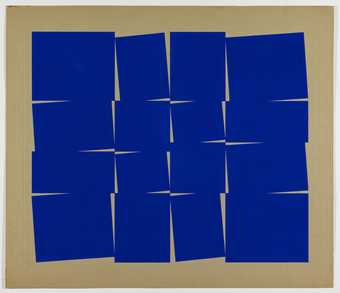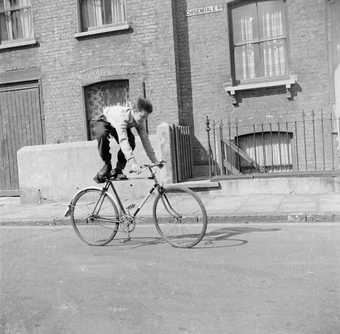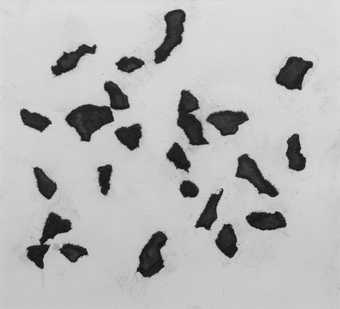
Jean Arp (Hans Arp)
According to the Laws of Chance
(1933)
Tate
These terms and conditions will apply to your access and use of our website at tate.org.uk. By using our website, you accept that you will be bound to the terms and conditions of use in full. If you do not agree to any of these terms and conditions, you must not access, use and/or contribute to our website. If you have any questions about these terms and conditions, you can contact us using the details set out below.
1. The Board of Trustees of the Tate Gallery ('Tate') operates tate.org.uk. Our principal place of business is at Millbank, London SW1P 4RG. If you have any questions please refer to our frequently asked questions. If the answers there do not address your particular concern, you may contact us.
2. Tate may change these terms from time to time so we recommend that you should check them regularly. We will always state at the bottom of these terms the date on which they were last updated and/or amended. Your continued use of tate.org.uk will be deemed acceptance of the updated or amended terms. If you do not agree to the changes, you should cease using this website.
Copyright, permissions and photography
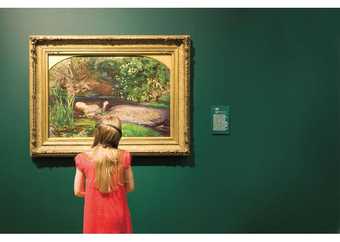
© Tate
Please note that the intellectual property rights in all content comprising or contained within this website address (URL) is owned by Tate, and other copyright owners as specified.Please note that the intellectual property rights in all content comprising or contained within this website address (URL) is owned by Tate, and other copyright owners as specified.
The contents of this website are published for your enjoyment. You may freely access and store the majority of the website’s contents on a temporary basis for the purposes of personal or private viewing, interaction or listening.
You might not be able to legally download or copy certain works in your country. It is your responsibility to ensure that your local law permits you to do this.
Reproducing content from the Tate website
Website content that is Tate copyright may be reproduced for the non-commercial purposes of research, private study, criticism and review, or for limited circulation within an educational establishment (such as a school, college or university).
The following uses of Tate copyright content are also permitted, except where other terms apply:
- Reproducing Tate copyright content, and Tate owned copyright expired artworks, for non-commercial research, private study, criticism and review, or for the purposes of teaching and instruction within an educational establishment. Where any artworks are published, the source of the content must be identified and the copyright status of the content acknowledged, e.g. ‘Title, Artist, Date of Work, Photo: © Tate, London [current year]’
- Limited quotation of Tate copyright texts or transcripts, for non-commercial research, private study, criticism and review, or use within an educational establishment, with due acknowledgement and citation. Where any text content is published, the author and/or source of the content must be identified and the copyright status of the content acknowledged, e.g. ‘© Tate, London [current year]’
- Reproducing Tate copyright content for the purposes of an educational examination, by a recognised UK exam authority
- Downloading Tate copyright audio and video content for non-commercial offline listening or viewing
- Downloading and printing of Tate copyright learning content, and whiteboard resources, for non-commercial educational use
- Embedding links to Tate audio and video content, where embedding is offered
- Reusing content published under a Creative Commons licence under the terms of the licence specified.
However, the following acts are not permitted in respect of any of the content featured on Tate’s website:
- Reproduction of website content for commercial purposes, or any rental, leasing or lending of content obtained or derived from the website
- Any use of the Tate logo, brand identities or Tate trademarks without prior consent from Tate
- Any considerable public dissemination, display or hosting of website content via any third-party platforms, including without limitation, the substantial or repeated extraction and/or storage of Tate website content in any retrieval system, or inclusion in any other computer program or work
- Reproduction of Tate website content on any social media platforms, except where other terms allow
- Inaccurate or distorted reproductions, colour treatments, alterations or adaptations of website content, except where other terms allow
- Publication of any unauthorised translations or transcriptions of website content, except where other terms allow
- False attribution of authorial or copyright credits, and the removal of any Tate metadata from digital file formats
- Unauthorised text/data mining of website content and metadata
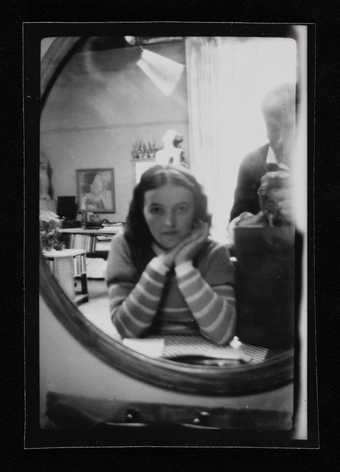
Anonymous
Photographs of Ben Nicholson taking a photograph of Barbara Hepworth
([c.1932])
Tate Archive
Visitor photography
- Photography in the main galleries is allowed for personal, non-commercial purposes only. It is the visitor’s responsibility to ensure no copyright is infringed. The use of flash and tripods is prohibited.
- Photography is permitted in some exhibitions. Please see notices in each exhibition.
Brief guide to copyright
Download our brief guide to copyright, which provides an introduction as well as suggestions for useful resources to explore the subject further.
Legal notice
If you are a rights holder and are concerned that you have found material on this website for which you have not granted permission (or is not covered by a copyright exception under the UK Copyright, Designs and Patents Act 1988) please contact Tate in writing stating the following:
- Your contact details
- The full details of the material’s creator
- The exact and full web address (URL) where you found the material
- Proof that you are the rights holder and a statement that, under penalty of perjury, you are the rights holder or are an authorised representative.

